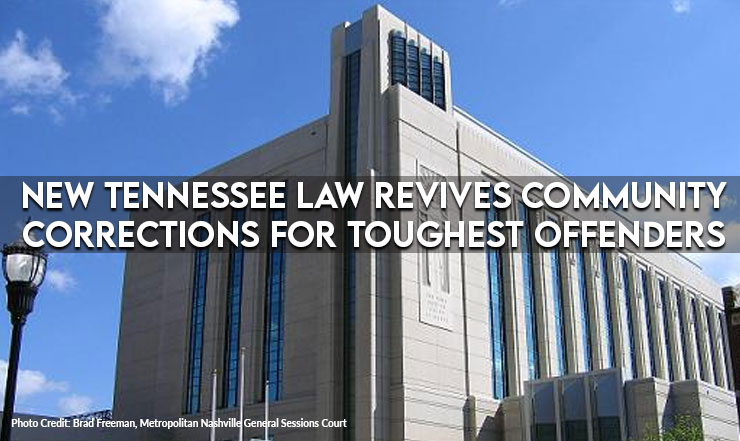Supporters say program offers probationers more intensive supervision.
Photo: Justice A.A. Birch Building in Nashville, in which a Community Corrections program has operated. Photo Credit: Brad Freeman, Metropolitan Nashville General Sessions Court
By Sam Stockard [Tennessee Lookout -CC BY-NC-ND 4.0] –
Buoyed by judges across the state, Tennessee’s Community Corrections program for hardcore offenders is set to be renewed when a new law takes effect July 1.
The Department of Correction is believed to be assessing the program to determine its next step, but lawmakers interested in keeping the program alive want to make sure the state doesn’t push it to the point of extinction.
The measure, sponsored by Rep. Andrew Farmer, R-Sevierville, and Sen. Ed Jackson, R-Jackson, keeps the program intact despite efforts by the Department of Correction to undermine it. The measure places “community-based supervision” back into state law and allows Community Corrections to provide intensive probation, treatment and supervision for convicted felons who, otherwise, could be headed to prison.
Judges statewide continued to sentence convicts to Community Corrections during the past year because they felt it provided a better alternative than probation under state supervision.
For instance, Criminal Court Judge Dee David Gay of Sumner County wrote an order in early January requiring the Community Corrections Office there to maintain the same standards it followed for years, before the forced changes.
The move by lawmakers and the judge came after the Department of Correction, under Gov. Bill Lee, bypassed the Legislature in 2022 with a request for proposals so narrowly written the state nearly eliminated the Community Corrections program.
Michael Walton, director of Westate Community Corrections in Union City, is hoping to see offenders returned to the program for more intensive supervision after they were sent to state probation or, in some cases, to jail. Thirteen of 18 programs remain in place with state contracts.
“A lot of the judges didn’t like that,” Walton said.
He is waiting to see the Department of Correction’s position on the new law. A Correction Department spokesperson didn’t respond to questions this week.

Lawmakers got involved last summer and took action to resurrect Community Corrections after the state put new mandates on the program. In some cases, for example, the state required licensed psychologists or licensed clinical social workers be hired to treat probationers, professionals who are difficult to employ.
The bill signed into law by the governor also contains a provision stating if a judge orders supervision by Community Corrections, the state Department of Correction will not penalize the organization.“This is a program that worked, and I was very disappointed to see it go away,” Farmer said during this year’s legislative session.Farmer was in a Sevierville courtroom last year, unaware the program was being phased out, when he noticed probationers sentenced to Community Corrections were being placed under other types of supervision. It spurred him to revive the program. With the new law, legislators won’t have to worry about having the “rug jerked out from under us,” Farmer said.Farmer says judges preferred the program because it had enough staff to oversee probationers whereas state probation officers are likely to have fewer meetings with probationers. In many cases, Community Corrections was located in judicial buildings just down the hall from the courtroom.
Lawmakers rejected a move by the governor in 2021 to eliminate the 37-year-old program as he passed a criminal justice reform package. But after they turned down his proposal, the Lee Administration changed the services sought for Community Corrections, undercutting the program to the point that many organizations didn’t bid on a new contract.
Some 7,000 people were being served, many who didn’t qualify for probation because their sentences were too long or they flunked probation and were bound for prison.
The program was budgeted at $13.8 million last fiscal year, but the state wasn’t projecting a savings despite the contract changes as the Department of Correction sought to replace it with its own probation personnel.




3 Responses
Pre-19th Amendment, when America was great, folks understood that the only effective punishments criminals minds responded to was hard labor and public hangings.
Yes Sir
What happened to all the offenders who were already in the community corrections program when it was shut down? We’re they even notified? I wasnt and i still am unsure of what my status is in the state of Tennessee criminal database. I was never able to get in touch with my corrections officer. I was about to expire so i assumed they just decided to expirate my sentence and release me.